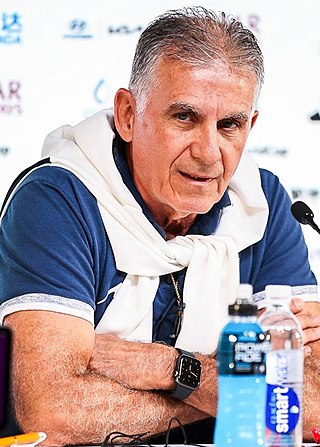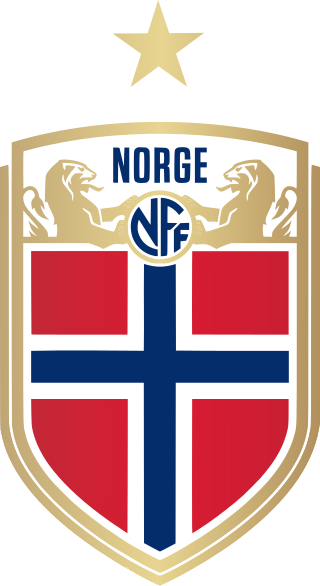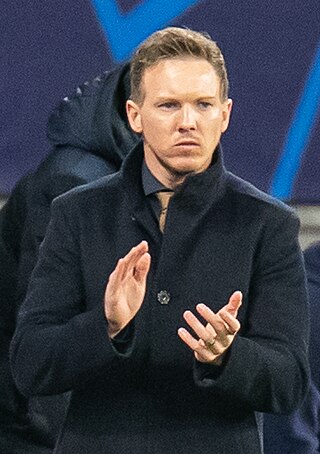Table
| Rank | Team | Pts | Pld | W | D | L | GF | GA | GD |
|---|---|---|---|---|---|---|---|---|---|
| 1 | 3 | 2 | 1 | 1 | 0 | 9 | 1 | +8 | |
| 2 | 1 | 2 | 0 | 1 | 1 | 1 | 9 | -8 |
The 1954 FIFA World Cup qualification Group 5 contained Austria and Portugal. [1]
| Rank | Team | Pts | Pld | W | D | L | GF | GA | GD |
|---|---|---|---|---|---|---|---|---|---|
| 1 | 3 | 2 | 1 | 1 | 0 | 9 | 1 | +8 | |
| 2 | 1 | 2 | 0 | 1 | 1 | 1 | 9 | -8 |
| 27 September 1953 | Austria | 9–1 | Vienna, Austria | |
| Ocwirk Probst Happel Wagner Dienst | Report | Águas | Stadium: Praterstadion Referee: Bauwens (Belgium) |
| 29 November 1953 | Portugal | 0–0 | Lisbon, Portugal | |
| Report | Stadium: Estádio Nacional Referee: Harzic (France) |
Austria qualified.
Head coach: ![]() Walter Nausch
Walter Nausch
| Pos. | Player | DoB | Games played | Goals | Minutes played | Sub off | Sub on | | | Club |
|---|---|---|---|---|---|---|---|---|---|---|
| FW | Robert Dienst | 1 March 1928 | 2 | 1 | 180 | 0 | 0 | 90 | 90 | |
| MF | Franz Golobic | 7 April 1922 | 2 | 0 | 180 | 0 | 0 | 90 | 90 | |
| MF | Gerhard Hanappi | 16 February 1929 | 2 | 0 | 180 | 0 | 0 | 90 | 90 | |
| DF | Ernst Happel | 29 November 1925 | 1 | 1 | 90 | 0 | 0 | 90 | – | |
| FW | Walter Haummer | 22 November 1928 | 1 | 0 | 90 | 0 | 0 | – | 90 | |
| DF | Walter Kollmann | 17 June 1932 | 1 | 0 | 90 | 0 | 0 | – | 90 | |
| FW | Alfred Körner | 14 February 1926 | 1 | 0 | 45 | 1 | 0 | 45 | – | |
| FW | Robert Körner | 21 August 1924 | 1 | 0 | 90 | 0 | 0 | 90 | – | |
| FW | Ernst Melchior | 26 June 1920 | 1 | 0 | 90 | 0 | 0 | – | 90 | |
| MF | Ernst Ocwirk | 7 March 1926 | 2 | 1 | 180 | 0 | 0 | 90 | 90 | |
| FW | Erich Probst | 5 December 1927 | 2 | 5 | 180 | 0 | 0 | 90 | 90 | |
| DF | Karl Stotz | 27 March 1927 | 2 | 0 | 180 | 0 | 0 | 90 | 90 | |
| FW | Theodor Wagner | 6 August 1927 | 2 | 1 | 180 | 0 | 0 | 90 | 90 | |
| FW | Otto Walzhofer | 21 June 1926 | 1 | 0 | 90 | 0 | 1 | 45 | – | |
| GK | Walter Zeman | 1 May 1927 | 2 | 0 | 180 | 0 | 0 | 90 | 90 | |
Head coach: ![]() Salvador do Campo
Salvador do Campo
| Pos. | Player | DoB | Games played | Goals | Minutes played | Sub off | Sub on | | | Club |
|---|---|---|---|---|---|---|---|---|---|---|
| FW | José Águas | 9 November 1930 | 1 | 1 | 180 | 0 | 0 | 90 | – | |
| MF | Serafim Baptista | 21 May 1925 | 1 | 0 | 90 | 0 | 0 | 90 | – | |
| GK | Barrigana | 28 April 1922 | 1 | 0 | 90 | 0 | 0 | 90 | – | |
| FW | Fernando Cabrita | 1 May 1923 | 1 | 0 | 43 | 1 | 0 | – | 43 | |
| DF | Ângelo Carvalho | 3 August 1925 | 2 | 0 | 180 | 0 | 0 | 90 | 90 | |
| FW | Rogério Pipi | 7 December 1922 | 1 | 0 | 90 | 0 | 0 | 90 | – | |
| MF | Castela | 26 October 1928 | 1 | 0 | 90 | 0 | 0 | 90 | – | |
| FW | Monteiro da Costa | 20 August 1928 | 1 | 0 | 90 | 0 | 0 | – | 90 | |
| DF | Félix | 14 December 1922 | 1 | 0 | 90 | 0 | 0 | 90 | – | |
| DF | Germano | 23 December 1932 | 1 | 0 | 47 | 0 | 1 | – | 47 | |
| GK | Carlos Gomes | 18 January 1932 | 1 | 0 | 90 | 0 | 0 | – | 90 | |
| MF | Hernâni | 1 September 1931 | 1 | 0 | 90 | 0 | 0 | – | 90 | |
| DF | Ângelo Martins | 19 April 1930 | 1 | 0 | 90 | 0 | 0 | 90 | – | |
| FW | Matateu | 26 July 1927 | 1 | 0 | 90 | 0 | 0 | – | 90 | |
| DF | Virgílio Mendes | 17 November 1926 | 2 | 0 | 180 | 0 | 0 | 90 | 90 | |
| DF | Serafim Neves | 29 August 1920 | 1 | 0 | 90 | 0 | 0 | – | 90 | |
| MF | Passos | 26 March 1922 | 1 | 0 | 90 | 0 | 0 | – | 90 | |
| FW | Travassos | 22 February 1926 | 1 | 0 | 90 | 0 | 0 | 90 | – | |
| FW | Vasques | 29 July 1926 | 2 | 0 | 180 | 0 | 0 | 90 | 90 | |
| DF | Artur Vaz | 3 April 1926 | 1 | 0 | 90 | 0 | 0 | – | 90 | |
The Portugal national football team has represented Portugal in men's international football competitions since 1921. The national team is controlled by the Portuguese Football Federation (FPF), the governing body for football in Portugal. Portugal's home games are played at the Estádio Nacional stadiums in Portugal, and its primary training ground and technical headquarters, Cidade do Futebol, is located in Oeiras. The head coach of the team is Roberto Martínez, and the captain is Cristiano Ronaldo, who also holds the team records for most caps and most goals.

The Sweden men's national football team represents Sweden in men's international football and it is controlled by the Swedish Football Association, the governing body of football in Sweden. Sweden's home ground is Friends Arena in Solna and the team is coached by Jon Dahl Tomasson. From 1945 to the late 1950s, they were considered one of the greatest teams in Europe.

The Hungary national football team represents Hungary in men's international football, and is controlled by the Hungarian Football Federation. The team has made nine appearances in the FIFA World Cup, and five in the UEFA European Championship. Hungary plays their home matches at the Puskás Aréna, in Budapest, which opened in November 2019.

The Switzerland national football team represents Switzerland in men's international football. The national team is controlled by the Swiss Football Association.

The Austria national football team represents Austria in men's international football competitions, and is controlled by the Austrian Football Association, the governing body for football in Austria.

The Turkey national football team represents Turkey in men's international football matches. The team is controlled by the Turkish Football Federation, the governing body for football in Turkey, which was founded in 1923 and has been a member of FIFA since 1923 and UEFA since 1962.

Carlos Manuel Brito Leal de Queiroz is a Portuguese football manager. He has served as the manager of his native Portugal's national team, the United Arab Emirates, South Africa, Iran, Colombia, Egypt and Qatar, leading South Africa (2002), Portugal (2010) and Iran to the FIFA World Cup. At club level, he has also managed Sporting CP, the New York/New Jersey Metrostars in Major League Soccer and Spanish club Real Madrid. He also had two spells as Alex Ferguson's assistant manager at English club Manchester United.

The Ukraine national football team represents Ukraine in men's international football, and is governed by the Ukrainian Association of Football, the governing body for football in Ukraine. Ukraine's home ground is the Olimpiyskiy Stadium in Kyiv. The team has been a full member of UEFA and FIFA since 1992.

The Iceland national football team represents Iceland in men's international football. The team is controlled by the Football Association of Iceland, and have been a FIFA member since 1947 and a UEFA member since 1957. The team's nickname is Strákarnir okkar, which means Our Boys in Icelandic.

The Serbia men's national football team represents Serbia in men's international football competition. It is controlled by the Football Association of Serbia, the governing body for football in Serbia.
The South Korea national football team represents South Korea in men's international football and is governed by the Korea Football Association. South Korea has emerged as a major football power in Asia since the 1980s, having participated in ten consecutive and eleven overall FIFA World Cup tournaments, the most for any Asian country. Despite initially going through five World Cup tournaments without winning a match, South Korea became the first Asian team to reach the semi-finals when they co-hosted the 2002 tournament with Japan. South Korea also won two AFC Asian Cup titles, and finished as runners-up on four occasions. Furthermore, the team won three gold medals and three silver medals at the senior Asian Games.

The Norway women's national football team is controlled by the Football Association of Norway. The team is former European, World and Olympic champions and thus one of the most successful national teams. The team has had less success since the 2011 FIFA Women's World Cup.
Juan López Fontana was a Uruguayan professional football manager who won the 1950 FIFA World Cup as the head coach of the Uruguay national team.

Karl Koller was an Austrian football player.
Júlio Cernadas Pereira, commonly known as Juca, was a Portuguese football midfielder and coach. Most of his career was associated with Sporting CP, as both player and manager.
The four teams in this group played against each other on a home-and-away basis. The winner Portugal qualified for the 1966 FIFA World Cup held in England.

The Germany national football team manager is a position created in 1926 and first held by Otto Nerz. The German team began playing matches in 1908, but for 18 years it had no manager. Instead a selection committee chose the team.
Association football is the most popular sport in nearly every African country, and thirteen members of the Confederation of African Football (CAF) have competed at the sport's biggest event – the FIFA World Cup.
This is a record of the Israel national team's results at the FIFA World Cup. They have qualified for the tournament on one occasion, in 1970. Israel qualified for the 1970 World Cup as an Asian team. Nowadays Israel competes in the European zone, as well as a full member of UEFA since the 1990s.
This is a record of Turkey's results at the FIFA World Cup. The FIFA World Cup, sometimes called the Football World Cup or the Soccer World Cup, but usually referred to simply as the World Cup, is an international association football competition contested by the men's national teams of the members of Fédération Internationale de Football Association (FIFA), the sport's global governing body. The championship has been awarded every four years since the first tournament in 1930, except in 1942 and 1946, due to World War II.